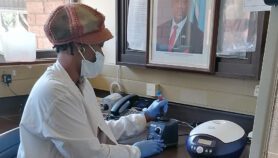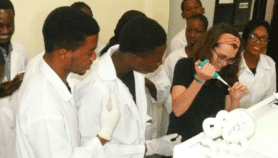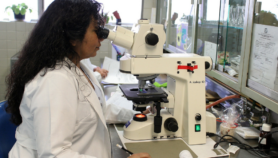By: George Achia
Send to a friend
The details you provide on this page will not be used to send unsolicited email, and will not be sold to a 3rd party. See privacy policy.
[NAIROBI] A programme that aims to strengthen the role of universities in research and development (R&D) on socioeconomic priorities such as health and agriculture has been launched in Kenya.
The Research Chairs initiative, announced last month (5 June) by the National Commission for Science, Technology and Innovation (NACOSTI) in Nairobi, could also attract Kenyan scientists in the diaspora back to an improved research environment, and retain top researchers already at universities.
Initially there will be two research chairs with research teams― on health systems and agricultural biotechnology —supported by NACOSTI and also by Canada's International Development Research Centre (IDRC), which will fund one of the chairs with a CDN$1 million (US$962,000) grant over five years in the project's pilot phase.
NACOSTI will select the research chairs from public and private universities′ applicants in Kenya. Future phases could include chairs in mining and space science.
Shaukat Abdulrazak, chief executive of NACOSTI says Kenya is losing its best people to countries that provide better remuneration, facilities and research funding —especially in the developed world.
"To enhance the capacity of universities to attract and retain top-notch researchers, this programme will providea favourable environmentfor research and innovation within the universities," he tells SciDev.Net.
He adds that the initiative will provide the research chairs with funds for equipment and better salaries for scientists, but that the host universities will need to commit to improving the institutional environment for research.
Agricultural biotechnology is a priority because the country is weak in agricultural innovation yet demand for food production is rising, Abdulrazak says.
Simon Carter, IDRC regional director for Sub-Saharan Africa, says that the initiative will help universities play a more active role in Kenya's socioeconomic development.
Maurice Bolo, director of the Scinnovent Centre, a Nairobi-based research and training organisation, says it is a timely initiative considering that Kenya's economic blueprint, Vision 2030, seeks to transform the country into a knowledge-based economy, underpinned by science, technology and innovation.
"This initiative emphasises university-industry linkages and is designed to ensure that knowledge generated at the universities help solve industries' problems," he says.
This article has been produced by SciDev.Net's Sub-Saharan Africadesk.














